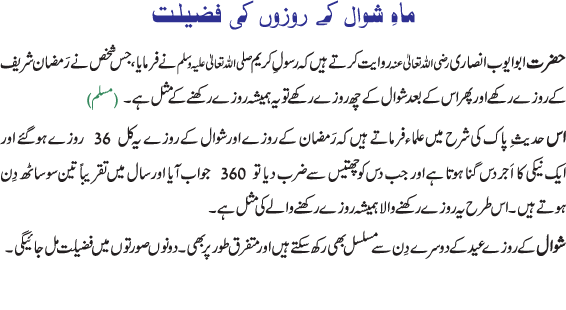
Mah-e-Shawal Kay Rozon Ki Fazeelat
Purification Of Wealth
“Establish Salah and pay Zakah and bow down with those who bow down in worship.” Al- Quran [al-Baqarah, 2:43]
Allah has related a story of some people who were earning that which Allah was providing them. However, they believed that they were earning their wealth because of their hard work and they forgot that it is actually Allah who provided them with what they had earned. They said why should we share our wealth with the needy people as it belongs to us because we had been working hard for it. Allah then tested them until they finally returned to their Lord in submission. Allah says in Surah al-Qalam:
“Surely We shall try them as We tried the owners of the garden when they swore that they would pluck its fruit the next morning, without adding any reservation ( such as Insha’Allah, God willing). So a calamity from your Lord came down upon it while they slept, and by the morning it lay as if it had been already harvested. At daybreak they called out to one another, saying: ‘Go out early to your crop if you want to pick its fruit.’ So they went, whispering to one another: ‘ Let no needy person enter upon you in the garden today.’ Thus they went out, fixed in their stingy resolve. But when they saw the garden, they cried: ‘Surely we must have lost our way! Nay, we have become destitute.’ The most upright among them said: ‘Did I not tell you to glorify Allah? Why did you not glorify him?’ Then they said: ‘Glory be to our Lord! Surely we were unjust,”. (And they started blaming one another).
Finally, they said: ‘”Woe to us! Surely we had become rebellious. It may be that our Lord will give us in exchange a better garden than this: surely to our Lord do we make our humble petition.’ Such is the punishment in this life, but the punishment in the Hereafter is even greater if they but knew it.” [al-Qalam – 68:17-33]
There is another story in the Qur’an. Qaroon was a wealthy man from Bani-Israael, (” And We gave him of the treasures, that of which the keys would have been a burden to a body of strong men”). His belief was that he had earned all his wealth because of his own intelligence or knowledge, (Qaroon said: “This has been given to me only because of knowledge I possess.”). Allah then destroyed him and all his wealth,” So We caused the earth to swallow him and his dwelling place. Then he had no group or party to help him against Allah, nor was he one of those who could save themselves.” [Surah al-Qasas]
Allah has made Zakah obligatory for Muslims to protect& purify our wealth. Rasulullah (sallallahu ‘alaihi was- sallam) said”Allah has made Zakat obligatory simply to purify your remainingproperty,..” [Abu Dawud]. We should know that the one Who favors us can also take back what He had given us. We should also remember that Zakah does not replace Sadaqah. Zakah is obligatory on those who are entitled to pay, whereas Sadaqah (charity) can be given by anyone including those who have a minimum or just a little more than nothing. Even a smile could be a Sadaqah.
“And in their properties, there was the right of the beggar, and the mahroom” [51:19]
Allah says about the Muttaqeen that they spend their income on those who ask them [beggars, lilssaili] as well as on those who are needy but they do not ask for help [Mahroom]. A beggar could be truly in need or could be a habitual one. However, it is the nobility of character that one should always give something when asked by someone. Even if a billionaire asks us for something, we should not let him go without anything, at least give him something. We should give according to our standard. How would you think about a millionaire giving a penny to charity?
“O believers, spend in Allah’s Way the best portion of the wealth you have lawfully earned and that which We have produced for you from the earth, and do not pick out for charity those worthless things that you yourselves would not accept but with closed eyes.
Bear in mind that Allah is Self-Sufficient, Praiseworthy.” [al-Baqarah – 2:267]
Allah says that those people who are saved from the greediness and love of wealth, it is they who are successful.
“So keep your duty to Allah and fear Him as much as you can; listen and obey; and spend in charity, that is better for yourselves. And whosoever is saved from his own covetousness, (waman yooqa shuhha nafsihi) then they are the successful ones.” [at-Taghabun – 64:16]
“And spend of that with which We have provided you before death comes to one of you and he says: “My Lord! If only You would give me respite for a little while (i.e. return to the worldly life), then I should give Sadaqah (or Zakat) of my wealth, and be among the righteous. [al-Munafiqoon – 63:10]
“And Al-Muttaqoon will be far removed from it (Hell).
He who spends his wealth for increase in self-purification, And have in his mind no favor from anyone for which a reward is expected in return, Except only the desire to seek the good pleasure of his Lord, the Highest; Such persons shall soon be well-pleased with Allah.” [al-Lail – 92:17-21]
Eiden Ka Bayan
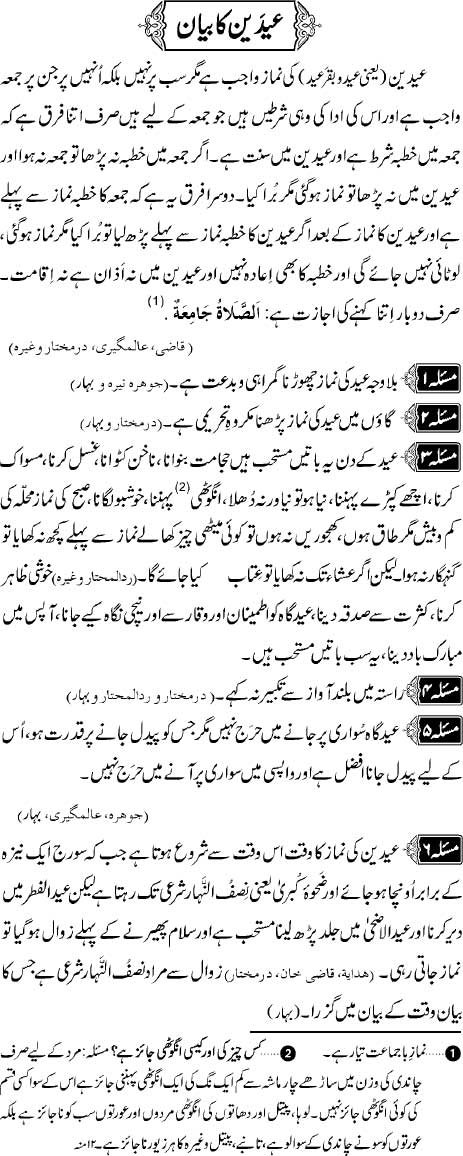
Eiden Ka Bayan
Namaz e Eid Ka Tariqa
Important Notes Regarding Sadaqatul-Fitr
I. Hadrat ibn ‘Umar said, “The Prophet made incumbent on every male or female, free man or slave, young or old, the payment of one Sa’ of dates or barley as Sadaqat-ul-Fitr. The Messenger of Allah commanded that this sadaqah be paid before one goes to perform the Eid prayer.” [Sahih Bukhari – Book on Zakah, Volume 1, Page 204]
II. Hadrat Hasan said: Hadrat Ibn Abbas preached to the people towards the end of Ramadan, standing on the pulpit (in the mosque) of al-Basrah. He said: “Bring forth the sadaqah relating to your fast.” The people, as it were, could not understand. “Which of the people of Medina are present here? Stand for your brethren, and teach them, for they do not know” said Hadrat ibn ‘Abbas. He further added: “The Messenger of Allah prescribed this sadaqah as one sa’ of dried dates or barley, or half a sa’ of wheat payable by every freeman or slave, male or female, young or old.” When Hadrat Ali came (to Basrah), he found that the price had come down. He said: “Allah has given prosperity to you, so give one sa’ of everything (as sadaqah).” [Sunan Abi Dawood – Book on Zakah, Volume 1, page 229]
III. Hadrat ‘Abdullah ibn Tha’laba or Tha’laba ibn ‘Abdullah (narrator cannot recall exactly what the name was) ibn Abu Saghir, who narrates from his father that the Messenger of Allah said, “One sa’ of wheat is enough from every two; young or old; freeman or slave; male or female. Those of you who are rich will be purified by Allah, and those of you who are poor will have more than they gave returned by Him to them.” [Sunan Abi Dawood – Book on Zakah, Volume 1, Page 228]
IV. Hadrat ‘Abdullah ibn ‘Abbas reported that the Messenger of Allah prescribed Sadqatul Fitr, so that the fasts (kept throughout the month of Ramadan) may be purified from any falsehood, wrongdoing or evil talk, and (at the same time) it shall assist to feed the poor and the needy. [Sunan Abi Dawood – Book on Zakah, Volume 1, Page 227]
V. Hadrat ‘Amr ibn Shu’aib reports from his father, who reports from his grandfather that the Holy Prophet sent a person that he calls out loud in the streets of Makkah al-Mukarramah that Sadaqat ul Fitr is Wajib (necessary) upon every Muslim male or female; freeman or a slave; young or old. [Sunan Tirmidhi – Book on Zakah, Volume 1, Page 146]
Important Notes:
1. Sadaqa-e-Fitr is Wajib upon such a person who owns assets, which equal the value of the Nisab. Such individuals should give Sadaqa-e-Fitr on their behalf and on behalf of their children if they do not own assets equal to the value of Nisab. Yes, however, if the children do own assets which are equal to or more than the Nisab limit, then the Sadaqa-e-Fitr shall be given from their own wealth. [al-Durr al-Mukhtar, Bahar-e-Shari’at]
2. The owner of Nisab in the ruling as regards Sadaqa-e-Fitr is such a person who has 7 ½ Tola gold (93 grammes 312 milligrammes,) or 52 ½ Tola silver (653 grammes 184 milligrammes), or equivalent value in money or any other form of asset. Or, one owns a business or non-business stock equivalent to that value, and these goods are added to the basic necessities of living (Hajat-e-Asliyyah).
3. For the Sadaqa-e-Fitr to become Wajib it is not necessary that one has fasted. Therefore, if anyone did not fast due to any excuse valid in the eyes of the Islamic Law; such as one is a Musafir (travelling to a destination which is at a distance of approximately 57 ½ miles or 92 kilometres), or is ill such that his illness shall become worse if he fasts, or because of weakness caused by old age, or – Allah forbid! – one did not keep the fasts due to any non-valid reason, then the Sadaqa-e-Fitr is still Wajib upon the person. [Radd al-Muhtar – Vol. 2 Page 76 and Bahar-e-Shari’at]
4. If the father is so poor (that he cannot give his own Sadaqa-e-Fitr let alone on behalf of his children,) or has passed away, then it is Wajib on the grandfather to give Sadaqa-e-Fitr on behalf of his grandchildren. [al-Durr al-Mukhtar]
5. If one wants to give anything besides wheat, barley, dates or raisins; for example, rice, millet or any other linseed, then the price of 1 sa’ of wheat or ½ sa’ of barley should be taken into consideration.
6. In terms of weight, one Sa’ is four pounds, six and a half ounces (4lb 6.5 oz) and half a Sa’ is two pounds, three and a quarter ounces (2lb 3.25 oz).
7. It is Mustahab (an act of great reward) to give the Sadaqa-e-Fitr on the morning of Eid day (after the beginning time for Fajr), before going to the Eidgah to perform the Eid prayer. [Fatawa-e-‘Alamgiri – Vol. 1, Page 180]
8. It is permissible to give Sadaqa-e-Fitr prior to the month of Ramadan or in Ramadan before the day of Eid. [Fatawa-e-‘Alamgiri – Vol. 1 Page 179 and al-Durr al-Mukhtar]
Extracted From Anwaar al-Hadith, Pages 146 to 148
by Hadrat Allama Mufti Jalal al-Din Qadiri al-Amjadi
Namaz e Eid Ka Tariqa
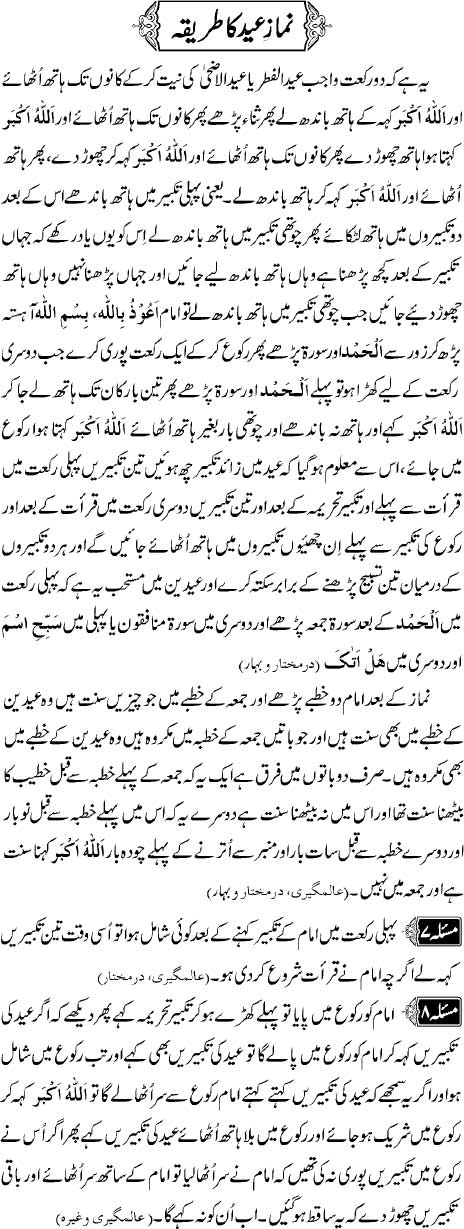
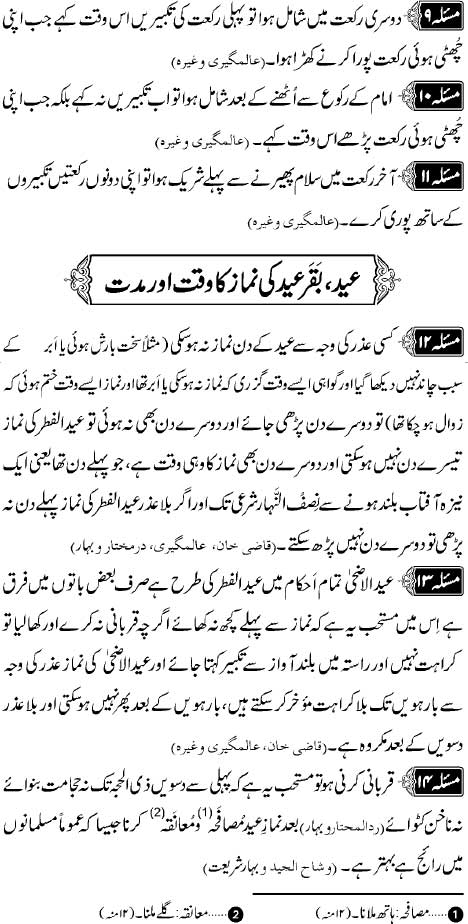
Namaz e Eid Ka Tariqa
What Holy Quran Says About Associating Allah In Worship
And how should I fear those whom you associate in worship with Allah (though they can neither benefit nor harm), while you fear not that you have joined in worship with Allah things for which He has not sent down to you any authority. (So) which of the two parties has more right to be in security? If you but know.” [6:81]
They (Jews and Christians) took their rabbis and their monks to be their lords besides Allah (by obeying them in things which they made lawful or unlawful according to their own desires without being ordered by Allah), and (they also took as their Lord) Messiah, son of Maryam (Mary), while they (Jews and Christians) were commanded [in the Tauraat (Torah) and the Injeel (Gospel)) to worship none but One Ilaah (God – Allah) Laa ilaaha illa Huwa (none has the right to be worshipped but He). Praise and glory be to Him, (far above is He) from having the partners they associate (with Him).” [9:31]
And they worship besides Allah things that hurt them not, nor profit them, and they say: “These are our intercessors with Allah.” Say: “Do you inform Allah of what He knows not in the heavens and on the earth?” Glorified and Exalted be He above all that which they associate as partners with Him! [10:18]
Say (O Muhammad): “I am only a man like you. It has been inspired to me that your Ilah (God) is One Ilah (God i.e. Allah). So whoever hopes for the Meeting with his Lord, let him work righteousness and associate none as a partner in the worship of his Lord.” [18:110]
And (remember) when We showed Ibrahim (Abraham) the site of the (Sacred) House (the Ka’bah at Makkah) (saying): “Associate not anything (in worship) with Me, [La ilaha ill-Allah (none has the right to be worshipped but Allah Islamic Monotheism], and sanctify My House for those who circumambulate it, and those who stand up for prayer, and those who bow (submit themselves with humility and obedience to Allah), and make prostration (in prayer, etc.);” [22:26]
And let them not turn you (O Muhammad ) away from (preaching) the Ayat (revelations and verses) of Allah after they have been sent down to you, and invite (men) to (belief in) your Lord [i.e: in the Oneness (Tauhid) of Allah (1) Oneness of the Lordship of Allah; (2) Oneness of the worship of Allah; (3) Oneness of the Names and Qualities of Allah], and be not of the mushrikun (those who associate partners with Allah, e.g. polytheists, pagans, idolaters, those who disbelieve in the Oneness of Allah and deny the Prophethood of Messenger Muhammad). [28:87]
Allah is He Who created you, then provided food for you, then will cause you to die, then (again) He will give you life (on the Day of Resurrection). Is there any of your (socalled) partners (of Allah) that do anything of that? Glory be to Him! And Exalted be He above all that (evil) they associate (with Him). [30:40]
He is Allah than Whom there is La ilaha illa Huwa (none has the right to be worshipped but He) the King, the Holy, the One Free from all defects, the Giver of security, the Watcher over His creatures, the All-Mighty, the Compeller, the Supreme. Glory be to Allah! (High is He) above all that they associate as partners with Him. [59:23]
Sadaqat-ul-Fitr Kay Ahkam
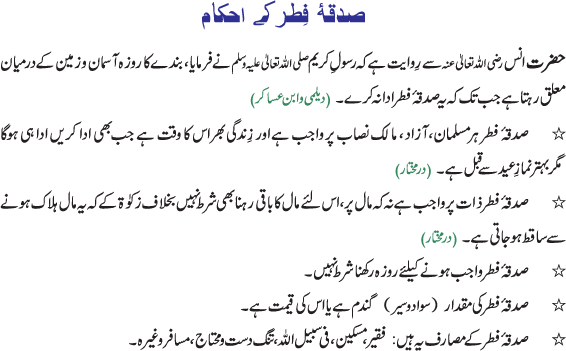
Sadaqat-ul-Fitr Kay Ahkam
Fatwas On Laylatul-Qadar
The signs of Laylatul-Qadar
Q: What are the signs of Laylatul-Qadar (the night of power)?
A: From amongst the signs of Laylatul-Qadar is that it is a calm night and the believer’s heart is delighted and at peace with it, and he becomes active in doing good actions, and the sun on the following morning rises clearly without any rays.
Shakyh Ibn al-‘Uthaymeen
Fataawa Ramadhaan – Volume 2, Page 852, Fatwa No. 841;
Fataawa ash-Shaykh Muhammad as-Saalih al-Uthaymeen – Volume 1, Page 563
Specifying the 27th of Ramadhaan as Laylatul-Qadar
Q: Some of the Muslims have taken the 27th night of Ramadhaan as Laylatul-Qadar. Is there any basis for this specification and is there any evidence for this?
A: Yes, there is a basis for this specification and that is that the night of the 27th of Ramadhaan is mentioned in the hadeeth, in Saheeh Muslim, on the authority of ‘Ubayy Ibn Ka’b (radhi-yallaahu ‘anhu).
However, the overwhelming opinion of the people of knowledge, from the forty or more opinions, is that Laylatul-Qadar is in the last ten nights. Because of this, it is befitting for (each) person to exert (himself in worship) during all the nights such that he does not deny himself the excellence of them and the reward (to be gained) in them.
Allah (Subhaanahu wa Ta’aala) says: “We sent it (this Quran) down on a blessed night [(i.e. Laylatul-Qadar) in the month of Ramadan]. Verily, We are ever warning [mankind that Our Torment will reach those who disbelieve in Our Oneness of Lordship and in Our Oneness of worship]”, [Soorah ad-Dukhkhaan, Aayah 3]
And He (Subhaanahu wa Ta’aala) also said: “Verily! We sent it (this Quran) down on the night of al-Qadar. And what will make you know what the night of al-Qadar is? The night of al-Qadar is better than a thousand months (i.e. worshipping Allah on that night is better than worshipping Him a thousand months, i.e. 83 years and 4 months). Therein descend the angels and the Rooh (Jibreel) by Allah’s Permission with all Decrees. Peace! (all that night, there is Peace and Goodness from Allah to His believing slaves) until the appearance of dawn”, [Soorah al-Qadar, Aayaat 1-5]
Shaykh Ibn ‘Uthaymeen
Fataawa Ramadhaan – Volume 2, Page 852, Fatwa No.842
al-Fataawa libni-‘Uthaymeen – Kitaab ad-Da’wah – Volume 1, Pages 204-205
Distinguishing a particular night with worship
Q: Some people seek Laylatul-Qadar so they are active by offering their prayers and other forms of worship whilst they do not do likewise on other nights in Ramadhan, so is this in accordance with that which is correct?
A: No! It is not in accordance with that which is correct, for certainly Laylatul-Qadar changes. So it could be on the night of the twenty-seventh, and it could be on any other night as has been indicated in many ahaadeeth. It has been confirmed that the Prophet (sal-Allaahu `alayhe wa sallam) said: ((In that particular year Laylatul-Qadar was revealed on the night of the twenty-first)). Therefore it is not befitting for a person to specify his stand (in prayer) on a particular night or distinguish a night on which he yearns to be Laylatul-Qadar (likewise). (Rather) striving in all of the last ten nights is from the guidance of the Prophet (sal-Allaahu `alayhe wa sallam), since when the last ten nights arrived he would tighten his waist belt and awaken his family and used to spend them all awake (in worship). So that which is befitting for the prudent believer is to strive in all of the last ten nights such that the reward does not pass him by.
Shaykh Ibn al-Uthaymeen
Fataawa Ramadhaan – Volume 2, Page 855, Fatwa No.844;
Fiqh al-Ibaadaat libni ‘Uthaymeen – Page 207
Salatul Tasbeeh Ka Tareeqa
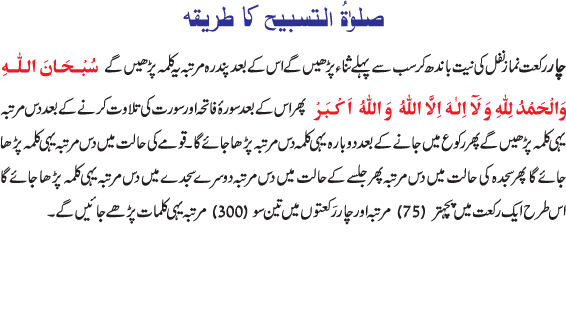
Salatul Tasbeeh Ka Tareeqa
Shaytaan Is A Strong External Reason Which Causes Iman To Decrease
He is held to be a strong external reason, which causes Iman to decrease. Shaytaan is a vehement enemy of the believers. He awaits calamities to afflict them. He has no desire or goal other than to jolt the Iman in the hearts of the believers and to weaken and corrupt it. Whoever submits to the whisperings of Shaytaan, complies with his notions, and does not retreat to Allah for refuge from him, his iman weakens and decreases. Indeed, it may disappear in its entirety depending on the Muslim’s response to such whisperings and notions.
It is for this reason that Allah has warned us of Shaytaan in the sternest sense and He has clarified his dangers, the detrimental consequences of following him as well as the fact that he is an enemy to the believers. Allah ordered the believers to take him as an enemy and therefore deliver themselves from him and his whisperings.
Allaah says: “O you who believe! Do not follow the footsteps of Shaytaan, and whosoever follows the footsteps of Shaytaan, then, verily he (i.e., Shaytaan) commands Fahshaa’ (i.e., to commit indecency and lewdness, etc.) and al-Munkar (i.e., disbelief, shirk, to do evil and wicked deeds, to speak or to do what is forbidden in Islam, etc.)…” [Soorah an-Noor (24):21]
Allah also says: “Surely, Shaytaan is an enemy to you, so treat him as an enemy. He only invites his hizb (followers) that they may become the dwellers of the blazing Fire.” [Soorah Faatir (35):6]
Allah says: “Verily! Shaytaan is to man an open enemy!” [Soorah Yoosuf (12):5]
Allah also says: “Shaytaan has taken hold of them. So he has made them forget the remembrance of Allah. They are the party of Shaytaan. Verily, it is the party of Shaytaan that will be the losers!” [Soorah al-Mujaadilah (58): 19]
Ibn al-Jawzee says: “Hence it is an obligation upon the sane person to be on his guard against this enemy, who has manifested his enmity since the time of Adam. He has sacrificed his life and self in corrupting the circumstances of the children of Adam and Allah has ordered one to be cautious of him…” He then mentioned a number of such texts and then said: “The like of this in the Qur’an is abundant.” [Talbees Iblees, pg. 23]
Aboo Muhammad al-Maqdasee says in the introduction of his book Dhamm al-Waswaas: “To proceed, Allah has indeed made Shaytaan an enemy to man. He sits in wait against him along the straight path and comes to him from every direction and way, as Allah has related from him that he said: “Surely I will sit in wait against them on Your Straight Path. Then I will come to them from before them and behind them, from their right and from their left, and You will not find most of them as being grateful ones (i.e., they will not be dutiful to You).” [Soorah al-A’raaf (7):16-17]
Further, Allah has warned us against following him and commanded us to possess animosity towards him and to oppose him, He said: “Verily! Shaytaan is to man an open enemy!” [Soorah Yoosuf (12):5]
He also said: “O Children of Adam! Do not let Shaytaan deceive you, as when he brought your parents (i.e., Aadam and Hawwaa’) out of Paradise…” [Soorah al-A’raaf (7):27]
Allah informed us of what he did with our parents as a way of cautioning us from obeying him and also to cut short any excuse for having followed him and Allah commanded us to follow the straight path …” [Dhamm al-Waswaas, pg.46. Also refer to Ibn al-Qayyim’s introduction of his own book Ighaathah al-Lahfaan, 1/10]
Thus, Shaytaan is an enemy of man. His desire is to corrupt the beliefs and to wreak havoc on one’s Iman. Whoever does not fortify himself from him through remembrance of Allah, resorting back to Allah and seeking refuge with Him, will become a breeding ground for Shaytaan, who will lure him to actions of disobedience, entice him to perpetrate prohibited matters, and push him to embark upon lewd sins. What a parish of his religion and what a corruption of his Iman will it be if man submits to him!
Ibn al-Qayyim, may Allah have mercy upon him, says: “Beware of enabling Shaytaan to establish himself in the very home of your thoughts and intentions, as he will corrupt them in such a manner that will make difficult its correction thereafter. He will cast all sorts of whisperings and harmful thoughts at you and he will prevent you from thinking about what may benefit you and it is you who have aided him against yourself by empowering him over your heart and thoughts and he then placed you in the possession of such thoughts.” [Al-Fawaa’id, pg. 309]
He, may Allah have mercy upon him, put forward an excellent similitude in this regard, which lies in total agreement. He says in another excerpt from his book:
“If you would like a consistent example for this, then his parable is that of a dog that is extremely famished; between you and the dog is a piece of meat or bread. He looks attentively at you and sees you not opposing him and he is so close to you. You drive him away and yell out at him and yet the dog refuses but to hover around you in circles and to try to deceive you with regard to what you possess in your hand.” [At-Tibyaan fee Aqsaam al-Qur’aan, pg. 419]
His intention, may Allah have mercy upon him, behind this parable is to demonstrate the scope of Shaytaan’s danger to a man if he does not seek refuge with Allah from him and fails to retreat back to Allah for refuge from his evil, through beneficial words of supplication and blessed forms of remembrance.
However, whoever turns away and is instead averse to that, Shaytaan will cling to him in this way in which he will tempt and dictate to him until he eradicates his Iman. Allah says:
“And whosoever turns away (blinds himself) from the remembrance of the Most Beneficent (i.e., this Qur’an and worship of Allah), We appoint for him a shaytaan to be a Qareen (i.e., an intimate companion) to him. And verily, they (i.e., shaytaans) hinder them from the Path (of Allah), whilst they think that they are guided aright! Till, when (such a) one comes to Us, he says (to his qareen), ‘Would that between me and you were the distance of the two Easts (or the East and West), a worst (type of) companion (you are indeed)!”[Soorah az-Zukhruf (43):36-38]
Posted from the Book: Causes Behind the Increase and Decrease of Eemaan, by Shaykh ‘Abdur-Razzaak al-‘Abbaad. Translated by Abu Safwan Farid ibn Abdulwahid Haibatan

